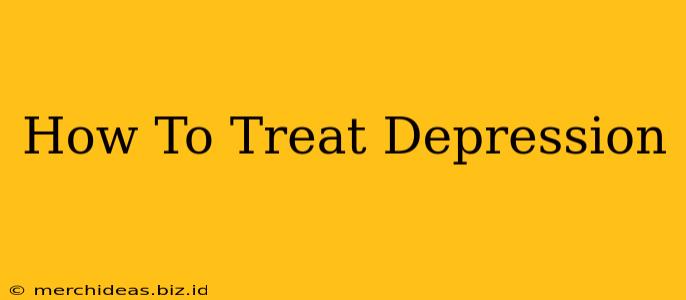Depression is a serious mood disorder that affects millions worldwide. It's characterized by persistent sadness, loss of interest, and feelings of hopelessness. While it can feel overwhelming, effective treatments are available. This guide explores various ways to treat depression, emphasizing the importance of a holistic approach.
Understanding Depression: The First Step to Treatment
Before diving into treatment options, it's crucial to understand the nature of depression. It's not simply feeling sad; it's a complex condition affecting your thoughts, feelings, and physical health. Symptoms can vary, but common signs include:
- Persistent sadness or low mood: A feeling of emptiness that lasts for extended periods.
- Loss of interest or pleasure: A lack of enjoyment in activities once found pleasurable.
- Changes in appetite or weight: Significant weight loss or gain, or changes in eating habits.
- Sleep disturbances: Insomnia, sleeping too much, or restless sleep.
- Fatigue or loss of energy: Feeling tired and lacking motivation even after rest.
- Restlessness or irritability: Feeling agitated or easily frustrated.
- Feelings of worthlessness or guilt: Excessive self-criticism and negative self-perception.
- Difficulty concentrating: Problems with focus and memory.
- Recurrent thoughts of death or suicide: Serious thoughts about ending one's life.
Important Note: If you're experiencing suicidal thoughts, please seek immediate help. Contact a crisis hotline, emergency services, or a mental health professional. Your life is valuable, and help is available.
Effective Treatment Strategies for Depression
Treatment for depression often involves a combination of approaches tailored to the individual's needs. There's no one-size-fits-all solution, and finding the right combination may take time and experimentation.
1. Psychotherapy (Talk Therapy)
Psychotherapy, also known as talk therapy, is a cornerstone of depression treatment. Different types of therapy can be effective, including:
- Cognitive Behavioral Therapy (CBT): Helps identify and change negative thought patterns and behaviors.
- Interpersonal Therapy (IPT): Focuses on improving relationships and communication skills.
- Psychodynamic Therapy: Explores unconscious patterns and past experiences that contribute to depression.
2. Medication
Antidepressant medications can be highly effective in managing depression symptoms. These medications work by balancing brain chemicals called neurotransmitters. Common types include:
- Selective Serotonin Reuptake Inhibitors (SSRIs): Increase serotonin levels in the brain.
- Serotonin-Norepinephrine Reuptake Inhibitors (SNRIs): Increase both serotonin and norepinephrine levels.
- Tricyclic antidepressants (TCAs): Affect multiple neurotransmitters.
- Monoamine oxidase inhibitors (MAOIs): Another type of antidepressant that affects neurotransmitters.
It's crucial to work closely with a psychiatrist to find the right medication and dosage. Antidepressants can have side effects, and it may take time to find the most effective medication and dose.
3. Lifestyle Changes
Making positive lifestyle changes can significantly impact your mental health and complement other treatments. These include:
- Regular Exercise: Physical activity releases endorphins, which have mood-boosting effects.
- Healthy Diet: Nourishing your body with a balanced diet provides the nutrients your brain needs to function optimally.
- Sufficient Sleep: Aim for 7-9 hours of quality sleep per night.
- Mindfulness and Meditation: Practicing mindfulness can help manage stress and improve self-awareness.
- Social Connection: Maintaining strong social connections is vital for mental well-being.
4. Alternative Therapies
Some individuals find relief from depression through alternative therapies, which should be used in conjunction with, not instead of, conventional treatments:
- Acupuncture: A traditional Chinese medicine technique involving inserting thin needles into specific points on the body.
- Yoga: Combines physical postures, breathing techniques, and meditation.
- Massage Therapy: Can help reduce stress and promote relaxation.
Seeking Professional Help
It's essential to remember that seeking professional help is a sign of strength, not weakness. If you're struggling with depression, don't hesitate to reach out to a mental health professional. They can provide a proper diagnosis, create a personalized treatment plan, and offer ongoing support. Early intervention is key to effective recovery.
Remember, recovery is possible. With the right treatment and support, you can manage your depression and live a fulfilling life.
